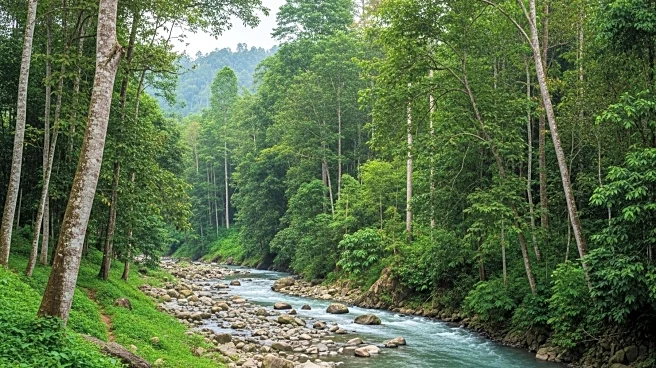What's Happening?
Harita Nickel, a major nickel mining company, has been implicated in environmental pollution affecting the water supply of Kawasi village on Indonesia's Obi Island. Investigations by The Gecko Project revealed that Harita Nickel knowingly allowed high levels of Chromium-6, a carcinogenic chemical, to contaminate local water sources. This pollution has led to widespread health issues among residents, including skin irritations and respiratory problems. Despite efforts to mitigate the contamination, Harita Nickel's measures have had limited success, with repeated spikes in Chromium-6 levels detected. The company has faced criticism for not adequately informing the local community about the risks associated with the contaminated water.
Why It's Important?
The situation in Kawasi village highlights the environmental and social challenges associated with nickel mining, a key component in the clean energy transition. As demand for nickel increases due to its use in electric vehicle batteries and renewable energy technologies, the environmental impact of mining operations becomes a critical issue. The pollution caused by Harita Nickel underscores the need for responsible sourcing and environmental stewardship in the mining industry. This case raises questions about the ethical responsibilities of companies involved in the global supply chain for clean energy technologies, and the potential health risks faced by communities near mining sites.
What's Next?
The ongoing pollution issue may prompt further investigations and pressure on Harita Nickel to improve its environmental practices. Local communities and environmental groups are likely to demand more transparency and accountability from the company. Additionally, there could be increased scrutiny from international stakeholders and investors who prioritize environmental, social, and governance (ESG) criteria. This situation may also influence policy discussions on mining regulations and community rights in Indonesia and other countries with significant mining activities.
Beyond the Headlines
The pollution incident at Kawasi village reflects broader ethical and environmental dilemmas in the mining sector. It raises questions about the balance between economic development and environmental protection, especially in regions rich in natural resources but vulnerable to exploitation. The case also highlights the disparities in wealth and health outcomes between local communities and global consumers benefiting from the clean energy transition. As the world moves towards decarbonization, ensuring that mining practices do not harm local ecosystems and communities is crucial for sustainable development.









